A Micro-Economic Approach to Government Support of R&D Investments in the Private Sector, Science, Technology and the Economy Program (STE) – Workin
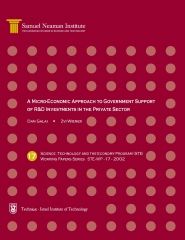
This paper focuses on the economic decisions of the government to subsidize investments in the private sector, and to discriminate among firms in its support programs. The presumption is that, by taxing corporate profits the government, affects investment decisions made by corporations and causes them to invest less than what would be socially optimal. Accordingly, […]
The Impact of R&D Spillover on Growth and Productivity in Israeli Manufacturing Industries 1990-1994, Science, Technology and the Economy Program (STE) – Working Papers Series STE-WP-14
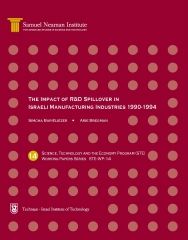
The study presents the positive external effects (spillovers) of investments in research and development in manufacturing industries, in Israel and abroad. This examination quantifies the spillover of domestic and imported technologies, through intermediates and capital goods, to establishments that did not participate directly in the research and development process. The analysis examines the interactions between […]
Universal Banking and Investment in R&D Intensive Companies an Empirical Analysis STE-WP-15 , 2002
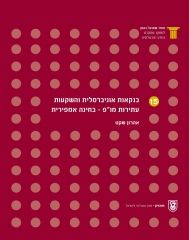
This study provides a new insight to why Israeli R&D intensive companies float their equity on foreign markets. A variety of studies have tackled this issue but very few discuss the relationship between strong universal banks who dominate various areas of the financial sector and availability of funds for commercially driven technology research. The study […]
Incentives and Invention in Universities, Science, Technology and the Economy Program (STE) – Working Papers Series STE-WP-18-2003
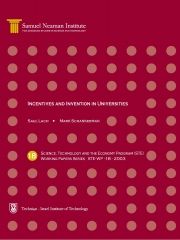
We show that economic incentives affect the number and commercial value of inventions generated in universities. Using panel data for 102 U.S. universities during the period 1991-1999, we find that universities which give higher royalty shares to academic scientists generate more inventions and higher license income, controlling for other factors including university size, quality, research […]
Financing R&D in Mature Companies: An Empirical Analysis, Science, Technology and the Economy Program (STE) – Working Papers Series STE-WP-10
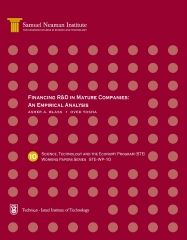
R&D intensive firms are often described as (1) relying mainly on equity financing; (2) investing primarily in intangible assets; (3) exhibiting a high market to book ratio (a high Tobin’s q); and (4) as being young and fast growing. We put these commonplace characterizations to systematic empirical tests. For our sample of Israeli manufacturing firms […]
A first look at Internet Business Methods Patents, Science, Technology and the Economy Program (STE) – Working Papers Series STE-WP-12
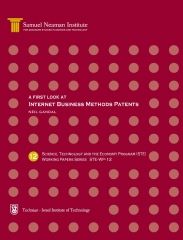
Despite the concerns about the proliferation of software and Internet business patents, there has been no systematic empirical research on Internet patents. In this project, I take a first-look at Internet patents. I examine whether there are systematic differences between Internet business method patents and other software patents in the same patent classes.
Is Venture Capital Special? Empirical Evidence from a Government Initiated Venture Capital Market, Science, Technology and the Economy Program (STE) – Working Papers Series STE-WP-9
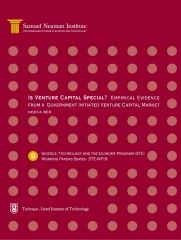
The financing extended by venture capital funds is examined in this paper, using a unique database that includes information about all the firms in the portfolio of all the Israeli venture capital funds in 1997-2000, and data on a control group of firms that were not backed by venture capital funds but were supported by […]
Conceiving New Industrial Systems: The Different Emergence Paths of the High-Technology Industry in Israel and Ireland, Science, Technology and the Economy Program (STE) – Working Papers Series STE-WP-11
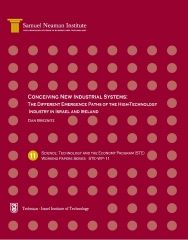
In the last decade, both Israel and Ireland have been on the forefront of a successful double revolution. In the international arena, the two small states have been the hotbeds of new technology based firms (NTBF) that establish themselves in global markets in the area of software and information technology, making the two states successful […]
The Military as a Public Space – The Role of the IDF in the Israeli Software Innovation System, Science, Technology and the Economy Program (STE) – Working Papers Series STE-WP-13
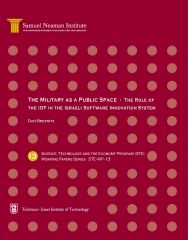
This paper focuses on the role played by the Israeli military (IDF) in creating and sustaining the highly innovative Israeli software industry. The IDF is often credited with a large role in the creation and sustained success of the Israeli high-tech industry. The paper analyze the activities and history of the IDF’s central computer unit, […]
Quantitative Growth Effects of Subsidies in a Search Theoretic R&D Modal, Science, Technology and the Economy Program (STE) – Working Papers Series STE-WP-16-2002
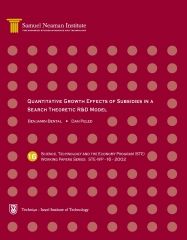
Should government subsidize R&D and does it matter how these subsidies are allocated? We examine these questions in a dynamic model where R&D is described as sequential sampling from a distribution of new ideas. Successful discoveries affect future available resources and incentives for further R&D. Consequently, there may be under-investment in R&D. We study the […]
